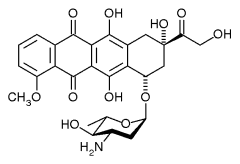For early-stage breast cancer that has spread to the lymph nodes under the arm, FDA has approved a new drug to treat the cancer after surgery has removed all known tumor.
Epirubicin hydrochloride injection (Ellence) is a member of the anthracycline class of anti-cancer medications. These are believed to work by interfering with a number of biochemical and biological functions within cancer cells, though their precise mechanism of action is not completely understood. These drugs are commonly used in combination with other medications to slow or halt the cancer's progression and potentially prolong some patients' lives.
FDA based its September 1999 approval on the results of two long-term, clinical studies in about 1,200 patients. The findings showed significant lengthening of the time without a relapse of the disease (recurrence of tumor) and increased five-year overall survival.
Adverse effects associated with the drug include nausea, vomiting, diarrhea, sores in the mouth, and hair loss. In addition, women have a slightly increased risk for treatment-related leukemia while taking the drug. Epirubicin may harm the fetus if given to a pregnant woman, and the drug may also cause premature menopause in premenopausal women. Also, men undergoing treatment with epirubicin should use effective contraceptive methods because therapy with the drug can cause chromosomal damage in sperm. Patients should be informed that there is a risk of irreversible heart damage associated with the drug.
The drug is manufactured by Pharmacia & Upjohn Company, N.J.
COPYRIGHT 2000 U.S. Government Printing Office
COPYRIGHT 2004 Gale Group



